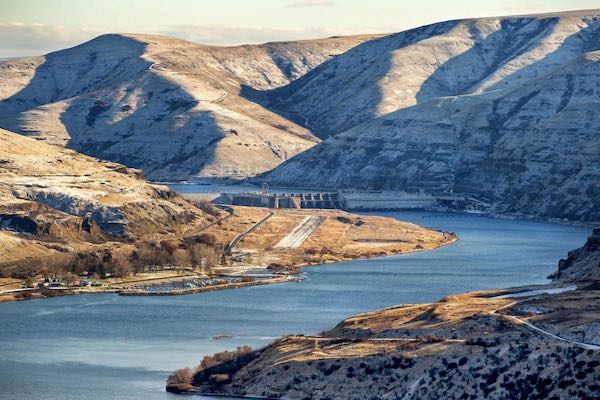forum
library
tutorial
contact

Further Review of Snake
River Dams Not Needed
by Editorial BoardYakima Herald-Republic, May 8, 2019
|
the film forum library tutorial contact |

|
Further Review of Snake
by Editorial Board |
 As with many politically contentious disputes, the latest in the roiling Lower Snake River Dam wars seems as much about money and jurisdictional posturing as the welfare of stakeholders residing on land and in the water.
As with many politically contentious disputes, the latest in the roiling Lower Snake River Dam wars seems as much about money and jurisdictional posturing as the welfare of stakeholders residing on land and in the water.
You've heard of "mansplaining," the practice among Y-chromosomes of elbowing into an issue and pontificating when their help has not been summoned, right? Well, what we have now with the longstanding to-breach-or-not-breach-the-Snake-River-dams question is what could be called "state-splaining."
How else do you figure that the Legislature would approve $750,000 in the newly minted operating budget to study an issue that already is being studied by several federal agencies? An Environmental Impact Statement on the dams, well underway by the U.S. Army Corps of Engineers and other regulatory agencies, is expected to be ready for public comment by fall 2020.
But now here comes the state, spurred by Gov. Jay Inslee's Southern Resident Orca Task Force, waving a dismissive hand at the feds and saying, essentially, we'll take it from here, fellas. Could it be that the newly formed state "stakeholder group" is anticipating a conclusion to the federal study that would cohere to their best-case narrative -- that breaching the dams would improve the chinook salmon population on the river and, as a result, save the salmon-starved Southern Resident Orca pod?
There is a chance that, ultimately, that's what the federal study will show. Remember, previous studies commissioned in 2001 and 2010 by the National Oceanic and Atmospheric Administration Fisheries concluded that dam removal would have only a slight impact in boosting salmon numbers. NOAA researchers reported that the dammed Snake River has similar fish survival levels as the free-flowing Fraser River in British Columbia.
You can infer from the legislative debate that took place in Olympia that state lawmakers and environmentalists simply don't trust the federal studies. Call it a case of reverse confirmation bias. In response, legislators have called for a "neutral third party" to, in essence, pat the divergent stakeholders -- tribes, local, state and federal officials, farmers, environmentalists and business types -- on the head and tell them what's best for all concerned.
While it's yet to be definitively known that breaching the dams would only minimally improve salmon spawning -- who knows, maybe the federal study might surprise critics and find it helps tremendously -- we have a better grasp on what removal would mean to those who depend on the river for power and commerce throughout Eastern and Central Washington.
 In short, a breach would leave folks in the lurch.
In short, a breach would leave folks in the lurch.
Foremost impacted would be the state's consumers of power -- you and me -- who depend on the hydroelectric power generated by water flowing through the dam's turbines to boil their broccoli, heat their homes and recharge their smartphones. A significantly scaled back flow of energy would affect citizens and businesses equally at a time when the state is cutting electricity produced by coal and natural gas.
Farmers, too, probably would be negatively affected when it comes to irrigation because dam removal would mean that the contours of the river would be altered. Fields would be underwater in some places, and other agricultural areas would suffer irrigation depletion. Agriculture companies would not be able to send their goods on barges down the river, which would mean that, because of the state's dearth of rail lines, more trucks would be needed to ship crops -- not exactly an environmental best-practice.
Beyond the economic impact, there also is the issue of jurisdiction to consider. In a way, it's ironic that many Central and Eastern Washington stakeholders are choosing the federal government over state control, since business usually is loath to ask for oversight and decision-making coming out of Washington, D.C. But many conservatives find themselves rooting for the feds.
Earlier in the spring, Congress members Dan Newhouse, R-Sunnyside, and Cathy McMorris Rodgers, R-Spokane, released a joint statement telling Inslee to butt out: "Congress has the sole authority to authorize breaching our federal dams and ... breaching them is out of the question. We commit to do everything in our power to save our dams." (Newhouse will hold a public meeting on the dams at 5:30 p.m. Monday at the Federal Building Auditorium, 825 Jadwin Ave. in Richland.)
Yet, wither the salmon and the orca?
Ultimately, the issue probably will wind up on a court docket -- again. In 2016, a U.S. District judge rejected the federal government's earlier plan to protect salmon (and, by proxy, the orcas) as being inadequate. He ordered a comprehensive study be launched, which is that federal initiative due in 2020.
Will the state's new attempt to leapfrog the feds only muck up the process and perhaps delay finding a way to help salmon without hurting people? That's the $750,000 question.
learn more on topics covered in the film
see the video
read the script
learn the songs
discussion forum
